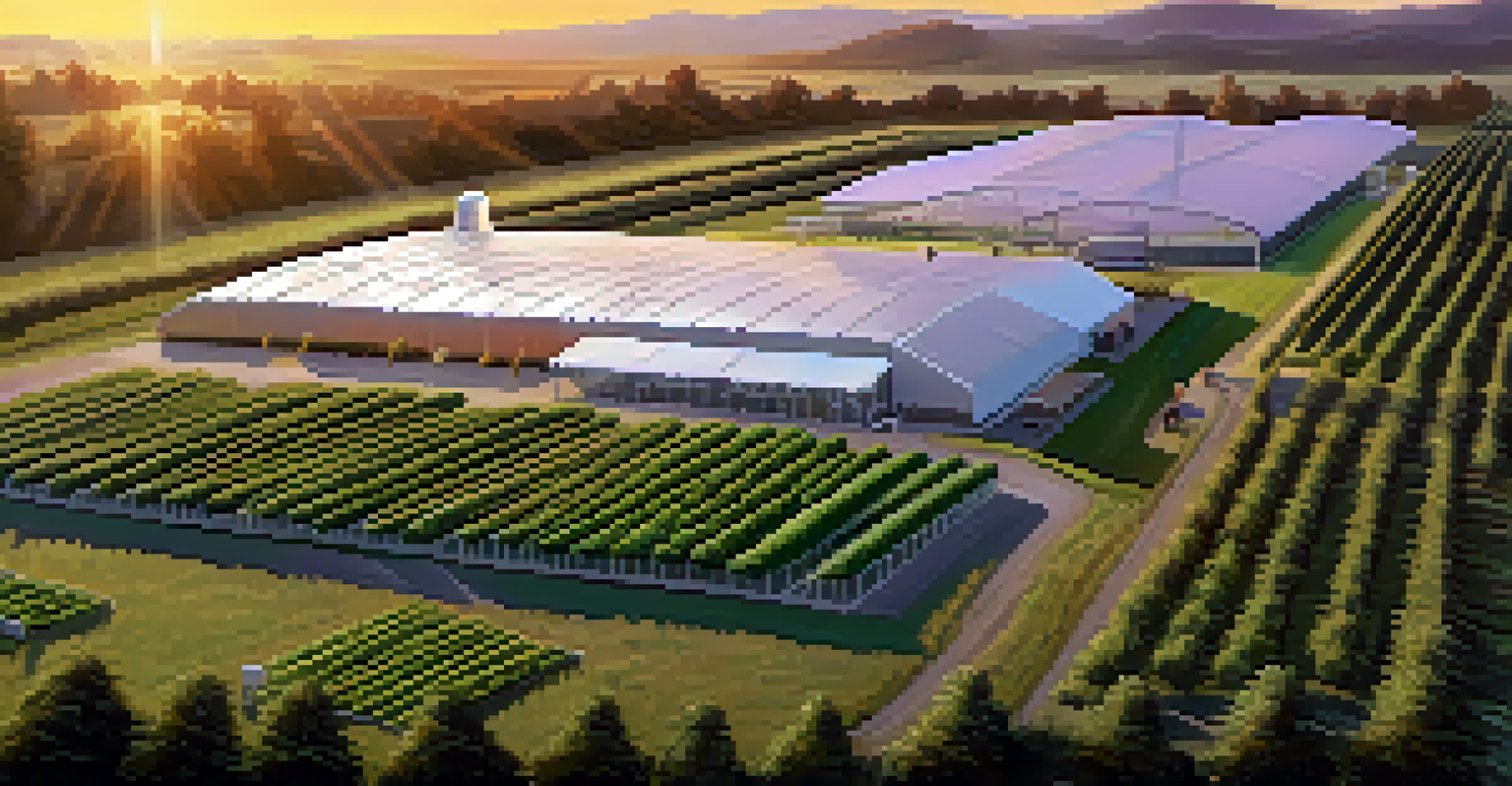Real Estate Growth Linked to Marijuana Industry Expansion

The Rise of the Marijuana Industry and Its Impact
In recent years, the marijuana industry has seen explosive growth, particularly in regions where legalization has occurred. This surge is not just a boon for cannabis businesses; it has a ripple effect on local economies and real estate markets. As dispensaries and cultivation centers pop up, the demand for commercial and residential properties in these areas skyrockets.
The legalization of marijuana is a significant opportunity for economic growth and development in our communities.
Investors are increasingly looking to capitalize on this trend, purchasing properties that cater specifically to the needs of cannabis businesses. For instance, warehouses and industrial spaces are being transformed into state-of-the-art grow facilities. This shift not only enhances property values but also attracts further investment into the surrounding communities.
Moreover, as cannabis becomes more mainstream, the stigma surrounding it diminishes, leading to increased consumer acceptance. This cultural shift is paving the way for more businesses, which in turn fuels further real estate development. Communities that embrace this change are likely to see sustained economic benefits.
Commercial Real Estate: A New Frontier
The commercial real estate sector is experiencing a transformation as cannabis businesses seek suitable locations to operate. Properties that were once considered undesirable are now hot commodities due to their potential for cannabis cultivation or retail. This demand is driving up rental prices and property values in specific markets, creating a unique opportunity for investors.

Real estate developers are taking notice, often designing new spaces with cannabis operations in mind. This could mean larger parking lots for customers or specialized facilities for production. As a result, commercial real estate is becoming more versatile, accommodating a variety of industries, including cannabis.
Marijuana Industry Fuels Real Estate
The booming marijuana industry is significantly driving demand and property values in both commercial and residential real estate markets.
Additionally, municipalities are revisiting zoning laws to accommodate this booming industry. This regulatory shift not only facilitates the establishment of new cannabis businesses but also attracts other enterprises to the area, further enhancing the local real estate market.
Residential Real Estate and Cannabis Culture
The influence of the marijuana industry extends beyond commercial spaces into residential real estate as well. Areas with a strong cannabis presence are becoming desirable locations for homebuyers who want to live near dispensaries and grow operations. This trend is particularly evident in states where marijuana has been legalized for recreational use.
As the cannabis industry grows, it transforms not just the economy but the very fabric of our neighborhoods.
As the demand for homes in these areas increases, property values are following suit. Homeowners are recognizing the potential for appreciation, while investors are eyeing properties that could be rented out to cannabis workers or enthusiasts. This interplay of demand is reshaping local housing markets, making them more dynamic and competitive.
Moreover, neighborhoods that embrace the cannabis culture often see an influx of young professionals and entrepreneurs. This demographic shift brings fresh energy to communities, leading to the development of new amenities and services that cater to this audience, further enhancing the appeal of residential properties.
Economic Benefits of Marijuana-Driven Real Estate Growth
The growth of the marijuana industry has notable economic benefits that extend into the real estate sector. Increased property demand leads to higher tax revenues for local governments, which can be reinvested into community services and infrastructure. These improvements can make areas more attractive to potential homebuyers and businesses alike.
Furthermore, the influx of cannabis-related businesses creates jobs, supporting local economies and increasing purchasing power. This, in turn, encourages further investment in real estate, perpetuating a cycle of growth that benefits everyone involved. As the industry continues to expand, the economic impact is expected to multiply.
Economic Growth Through Cannabis
The rise of cannabis businesses leads to increased tax revenues and job creation, benefiting local economies and enhancing community services.
Additionally, many communities are using revenue generated from marijuana sales to fund essential programs and projects. This strategic investment not only improves quality of life but also enhances property values as neighborhoods become more desirable places to live and work.
Challenges Facing the Marijuana-Real Estate Connection
While the connection between the marijuana industry and real estate growth is promising, it is not without its challenges. Regulatory hurdles can create obstacles for cannabis businesses seeking to establish themselves, which can, in turn, affect real estate values. Investors must navigate a complex web of local and state laws that can change rapidly.
Moreover, the federal status of marijuana remains a significant concern. Until it is federally legalized, banking and financing options for cannabis businesses can be limited, impacting their ability to secure properties. This uncertainty can deter potential investors from entering the market, creating a bottleneck in growth.
Additionally, as competition among cannabis businesses intensifies, not all will thrive. Properties that have been heavily invested in may face depreciation if a business fails or relocates. Investors need to conduct thorough research and due diligence to mitigate these risks and ensure long-term success in the evolving landscape.
Future Trends: What Lies Ahead for Real Estate and Cannabis
Looking ahead, the future of real estate growth linked to the marijuana industry appears bright, with several trends emerging. As more states legalize cannabis, we can expect to see an even greater influx of businesses seeking optimal locations. This will likely lead to innovative real estate solutions tailored specifically for the cannabis sector.
Moreover, as public perception continues to shift towards acceptance, the demand for cannabis-related real estate will likely diversify. We may see an increase in mixed-use developments that incorporate residential, commercial, and recreational spaces tailored to cannabis culture. This could enhance community engagement and create vibrant neighborhoods.
Challenges in Cannabis Real Estate
Regulatory hurdles and the federal status of marijuana present challenges that investors must navigate to succeed in the evolving real estate landscape.
Lastly, technology will play a crucial role in shaping the future of both industries. From advanced cultivation methods to smart home technology that caters to cannabis enthusiasts, the intersection of real estate and the marijuana industry will evolve. Staying attuned to these trends will be essential for investors and stakeholders looking to thrive in this dynamic landscape.
Case Studies: Successful Cannabis-Related Developments
Examining successful case studies can provide valuable insights into how the marijuana industry has positively impacted real estate. For instance, cities like Denver and Seattle have seen significant real estate booms linked to their thriving cannabis markets. In these areas, the establishment of dispensaries has led to increased foot traffic and a revitalization of neighborhoods.
Additionally, some developers are creating cannabis-centric communities that cater to consumers and businesses alike. These developments combine residential living with retail spaces for cannabis products, creating a unique lifestyle offering. Such projects not only enhance property values but also foster a sense of community among residents.

These examples underscore the symbiotic relationship between the marijuana industry and real estate. By learning from these successful ventures, investors and developers can better navigate their own paths in this promising market, leveraging the growth of cannabis to drive real estate success.